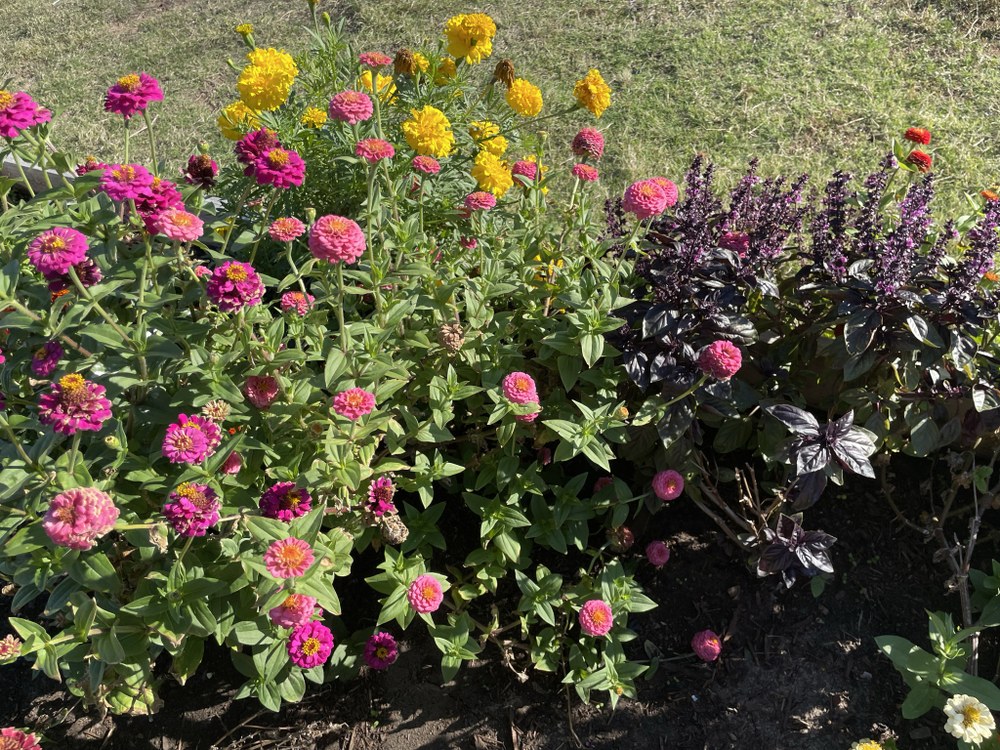Beaver County Master Gardeners would love to come speak to your group!

Master Gardeners can present to your group on a variety of topics, from pollinators to vegetable gardening to Spotted Lanternfly. Photo by Lyndsay Feather
Beaver County Master Gardeners are piloting a new intake process and have several presentations available during the spring of 2025; please see below for descriptions of each presentation.
To request a Master Gardener come speak to your group, please fill out this form.
We kindly ask for a $100 donation for each presentation so that we may continue to grow our impact and reach in the community. Your support is essential for helping us accomplish our mission in Beaver County! If this amount is prohibitive for your group, we can discuss a sliding scale amount.
Available presentations:
Spotted Lanternfly (for adults)
Learn about the origins, life cycle, feeding habits, and control mechanisms for this invasive pest in Pennsylvania landscapes. Spotted Lanternfly presentations are offered free of charge as a service to the community.
Spotted Lanternfly (for youth)
Did you know that the Pennsylvania Department of Agriculture employs a dog named Lucky to help sniff out Spotted Lanternfly egg masses? Learn about this invasive pest through the engaging story of Lucky the Dog! Spotted Lanternfly presentations are offered free of charge as a service to the community.
Pollinator partners (for adults)
Pollinators are a crucial part of a healthy landscape and are essential for the production of many kinds of crops. This highly engaging presentation will demonstrate that there are so many more kinds of pollinators in addition to honeybees and describe how factors like flower color, shape, and structure are key elements to attracting a diversity of pollinators. Learn practical tips for increasing the number and types of pollinators in your garden to create a beneficial ecosystem.
Pollinator partners (for kids)
Did you know that different kinds of insects and other pollinating creatures have favorite foods? Flower shape, color, and structure play a key role in attracting different types of bugs and critters. Learn all about how pollination works, why it matters, and about many different kinds of pollinators in our region during this fun, engaging presentation.
Vegetable gardening 101
Vegetable gardening seems like a simple, straightforward hobby, but with so much confusing or conflicting information on the internet, it can be hard to know how to get started in an uncomplicated way. This presentation can be geared toward total beginners or slightly experienced gardeners who want to cut through the noise and learn about science-based approaches to success. It covers soil health, crop selection, garden types (raised beds or in-ground?), and an introduction to Integrated Pest Management, an evidence-based approach to controlling insects and diseases in the garden.
Growing a pollinator-friendly landscape
If you're aware of the benefits of pollinators and an eco-friendly yard or landscape but are struggling to make effective garden decisions toward this end, this presentation is for you. Summarizing the content of our flagship "Environmental Field Studies" series, this session introduces the philosophy for developing an ecologically impactful landscape, including identifying invasive and native plant species, effectively managing invasive species, and planting natives to encourage pollinators. Then we discuss the Master Gardener Pollinator Habitat Certification as a tool for initiating these ecological benefits (including details about the application process) and how the Environmental Field Studies series can help you learn more and take practical steps toward this end.
Soil health and composting
Soil is the foundation for success and failure in both the vegetable garden and wider landscape, but it can be confusing to determine what your soil needs to improve the success of your plants. This presentation digs into soil basics like structure, texture, and organic matter, how to perform a soil test, tips for effective fertilization, and how to get started with composting.
Quick guide to a better garden (and pesky animals)
This engaging presentation is a sure crowd-pleaser for gardeners of all types and experience levels. Topics covered include improving your garden soil, planting suggestions, pruning, and tips for deterring pesky garden critters!
Bringing the garden inside: building a terrarium
This hands-on demonstration will discuss principles for building a successful succulent terrarium and offers two options for take-home engagement:
1. Each participant makes and takes home their own terrarium in a jar (additional $7-8 per participant), OR
2. The speaker demonstrates terrarium techniques by building one large, closed terrarium during the presentation and raffling it off to one participant (additional $25 total)
Ladybird Johnson and the conservation of America's wildflowers
Discover the story of how Lady Bird Johnson’s lifelong love of wildflowers led to the Highway Beautification Act and the establishment of the Lady Bird Johnson (LBJ) Wildflower Center. You'll also learn how to access and utilize the LBJ Research Center for native plant lists and hear tips for selecting and planting native wildflowers today.
Our American Gardens: using native plants in your landscape
If you enjoy history and gardening this presentation may be for you. Learn about how our first four presidents’ love of native plants influenced their landscaping philosophies. Then, jump to present day and learn about how to follow in their footsteps and use native plants in your landscape. Featured books: The Founding Gardeners by Andrea Wulf and Bringing Nature Home by Douglas Tallamy.
Presidential Trees
Meet the 12 presidential trees on the White House grounds, featuring Franklin Roosevelt’s White Oak, and learn why it is the number one "Keystone" tree. You'll also glean planting tips on growing oak trees.

